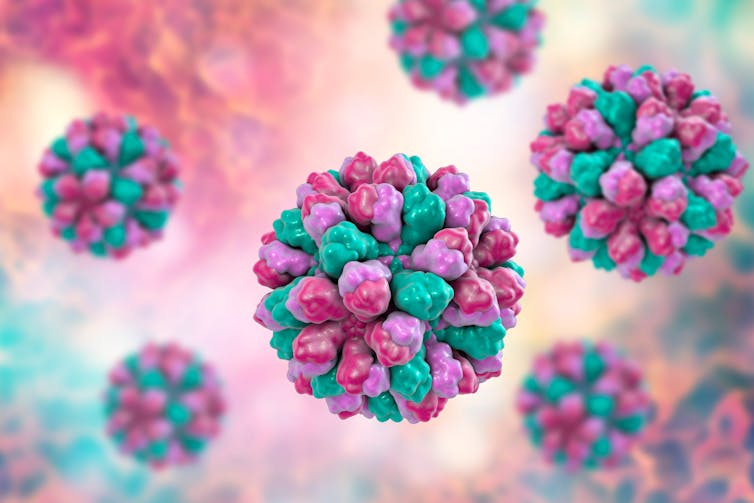Norovirius. Image: The Conversation.
Norovirus cases rising in the UK
The United Kingdom has been experiencing a sharp rise in cases of norovirus and elderly people are at huge risk.
Norovirius. Image: The Conversation.
Recently there has been a sharp rise in cases of norovirus, sometimes called the winter vomiting bug, in the UK.
According to the UK Health Security Agency, cases in England are 66% higher than the average for this time of year, and at their highest level in more than a decade. Surveillance data shows norovirus outbreaks have increased in hospitals, schools, and particularly in care homes. The majority of reported cases are in people over 65.
There have also been more norovirus infections reported than usual in Scotland, while the US and Canada are similarly recording increasing cases.
So what do you need to know about norovirus?
Norovirus was first identified in 1968 as the cause of an outbreak of gastroenteritis in Norwalk, Ohio. The virus is the most common cause of gastrointestinal symptoms, responsible for about one in five cases of gastroenteritis globally.
Norovirus generally causes nausea, vomiting, diarrhoea and stomach pain. Although in most cases the infection clears in a couple of days, it can take longer. The symptoms can lead to dehydration, sometimes requiring hospitalisation, especially in people with weakened immune systems, older adults and children.
In rare cases, people can die from norovirus. It’s been estimated that norovirus is responsible for roughly 699 million infections and over 200,000 deaths worldwide each year, with the largest proportion of deaths occurring in children from lower-income countries. Poorer sanitation and access to safe drinking water in developing countries compared with developed countries are important factors.
Norovirus is highly contagious
People with norovirus are most contagious when they have symptoms, and even during the first few days after they recover.
Norovirus spreads via the faecal-oral route. This means you catch it by accidentally getting tiny particles from the vomit or faeces of an infected person in your mouth. This might happen, for example, if the virus particles land on surfaces you touch, contaminate the food you eat, or if you have direct contact with someone who is infected.
ALSO READ: Glebelands Eight trial: Hitmen handed life sentences
Norovirus can also contaminate food if the food is grown or harvested with contaminated water, for example if fruit and vegetable crops are irrigated with contaminated water or if shellfish are harvested from contaminated water (shellfish can accumulate norovirus in their bodies).
Noroviruses are relatively resistant in the environment. For example, they can survive for long periods on different surfaces, and at high temperatures.

How can you protect yourself?
Unfortunately, there are no approved vaccines or antivirals to combat norovirus, despite significant research efforts. Notably, there are many different strains of norovirus, and its genetic diversity makes the development of effective solutions more difficult.
That said, there are some preventive measures you can take to reduce norovirus transmission.
- Wash your hands with soap and water for at least 20 seconds before preparing food, eating and after going to the toilet. Hand sanitisers can be used in addition to hand washing, but hand sanitiser doesn’t work well against norovirus, so hand sanitiser is not a substitute for washing hands with soap and water.
- Wash fruit and vegetables well. And thoroughly cook shellfish to an internal temperature of at least 62°C (steam cooking may not heat it enough to kill norovirus).
- If possible, people who are infected should isolate from others until at least 48 hours after their symptoms have passed. They should not be involved in any food preparation.
- If someone in the household has gastrointestinal symptoms, routinely clean surfaces and any objects that are touched, such as kitchen counters, doorknobs and remote controls. Gloves should be worn when cleaning and disinfecting. It’s also advisable to wear a mask if cleaning an infected person’s vomit.
- Thoroughly wash clothes or linen that may be soiled with the vomit or faeces of someone who has been infected. Hot water and detergent should be used for washing at the maximum available cycle length, before machine drying at the highest heat setting.
If you do catch norovirus, it’s important to drink plenty of water or electrolyte drinks to prevent dehydration. This is especially true for people who are vulnerable. Fever-reducing medications (such as paracetamol) and anti-nausea medications may help relieve symptoms. If symptoms become severe or you are concerned, seek medical help.
Article by: Manal Mohammed. Senior Lecturer, Medical Microbiology, University of Westminster
This article is republished from The Conversation under a Creative Commons license. Read the original article.
